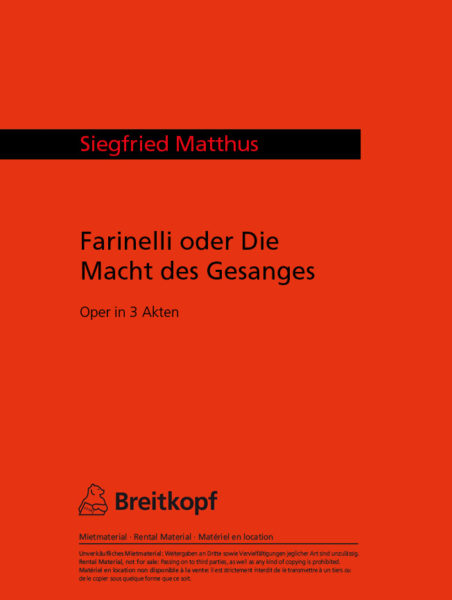Siegfried Matthus (1934–2021) Farinelli oder Die Macht des Gesanges
Oper in 3 Akten 1996/97 Text: Siegfried Matthus
12 Solisten - Chor: SATB. Knaben (SA) - 2(Picc.A-Fl).2(Eh).2(B-Klar).1. – 0.1.1.0. – Schl(2) - Hfe.E-Bass – Cemb.Cel.Synth – Str: 5.4.3.2.1.
Uraufführung: Karlsruhe, 28. Februar 1998
Nachdem Sie die gewünschten Ausgaben in den Warenkorb gelegt haben, können Sie dort die benötigte Stückzahl bei Bedarf noch anpassen.
AD: abendfüllend
Libretto: Siegfried Matthus unter Verwendung einer Textvorlage von Walter Jens
Ort und Zeit: Gemach des Königs Philipp V. von Spanien, Mitte des 18. Jahrhunderts
Personen: Farinelli (Countertenor/Alt) - König Philipp V. von Spanien (Bariton) - Nicola Porpora (Bariton) - Leibarzt des Königs, auch Barbier (Tenor) - Beichtvater des Königs, auch Impresario und Priester (Bass) - Maria (Bellino), später Anna Maria StradA (Sopran) - Georg Friedrich Händel (Bariton) - Jenny, Jim, John, englische Operntruppe (Sopran, Tenor, Bariton) - Der junge Carlo Broschi (Knabensopran)
Mein Farinelli wird stilistisch im Theatralischen wie im Musikalischen eine sehr vielfältige Oper werden (Zauberflöte!). Die verschiedenen Elemente reichen von der Großen Oper über die Spieloper bis zum Musical. Im Mittelpunkt steht jedoch der Belcanto-Gesang. Die Gesangsstimmen werden dominieren und das Orchester nur eine, dem heutigen Klang entsprechende, Begleitfunktion erhalten. Bei den Arien Farinellis verwende ich historische Melodiemodelle, ohne sie jedoch zu zitieren oder zu gar zu bearbeiten. Mein Rezitativstil ist aus dem barocken inspiriert, erhält jedoch durch den Einsatz von Schlagzeug und Synthesizer einen heutigen Sound.
(Siegfried Matthus)
Der depressiv veranlagte spanische König Philipp V. hört imaginäre Stimmen, die ihn quälen und martern. Immer auf dem Höhepunkt eines solchen Anfalles ruft er nach dem berühmten, in seinen Diensten stehenden, Kastratensänger Farinelli, der ihn mit seinem Gesang beruhigen kann. An den langen Abenden und in den durchwachten Nächten, erzählt Farinelli auf Bitten des Königs aus seinem Leben.
In Rückblenden erfahren wir, wie geschäftstüchtige Impresarios Kinder von der Straße holen und ein Barbier ihre schönen Sopranstimmen durch einen kleinen chirurgischen Eingriff rettet. Diese Knaben werden an den damaligen Konservatorien in strengem Regiment als Sänger ausgebildet.
Farinelli erzählt von seiner großen Liebe zu einer Gesangsschülerin, die er nicht heiraten darf, weil die Kirche ihm als zeugungsunfähigen Mann die Ehe verweigert. Die junge Sängerin verkleidet sich als Kastrat Bellino, und beide feiern in den berühmten Opernhäusern Europas große Erfolge.
In London tobt ein erbarmungsloser Konkurrenzkampf zwischen dem Theater, in dem Farinelli große Erfolge feiert, und dem Theater Händels. Dieser will durch technisch neuartige Maschinenopern den Erfolg wieder auf seine Seite ziehen. Straßensänger, die diese erstarrten Opern musicalhaft parodieren, übertrumpfen Farinelli und auch Händel.
Farinelli gelingt es tatsächlich, den König mit seinem Gesang zu heilen. Ihr seid ein Orpheus, Farinelli! ruft er in seiner Euphorie und fordert den Sänger auf, nun seine Kunst für die Rettung der Welt einzusetzen.
Farinellis Ruhm und Einfluss am spanischen Königshof sind ständig gewachsen. Die Neider und Intriganten, aus deren Sicht zu viel Geld für die Kunst ausgegeben wird, sehen ihre Zeit gekommen, dem staatsgefährdenden Treiben der beiden ein Ende zu bereiten. Mit der Parole Das Singen führt zum Staatsbankrott versuchen sie, Farinelli und den König mundtot zu machen. Die Macht des Gesanges ist jedoch nicht aus der Welt zu vertreiben.
Die dramaturgische Konstellation des Stoffes zwang mich, vielfältige formale und stilistische Mittel einzusetzen. Aus den heute noch vorhandenen Farinelli-Arien habe ich Melodiesegmente verwendet, weiterhin barocke Gesangs- und Formelemente benutzt, singspiel- und musicalartige Modelle eingesetzt, bis hin zu einem Rap-Gesang über einen Techno-Rhythmus. Im musikalischen Zentrum der Oper steht der Gesang und die menschliche Stimme. Farinelli ist eine Belcanto-Oper.
Siegfried Matthus









